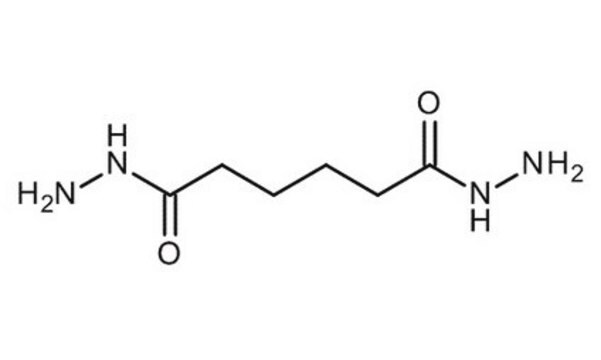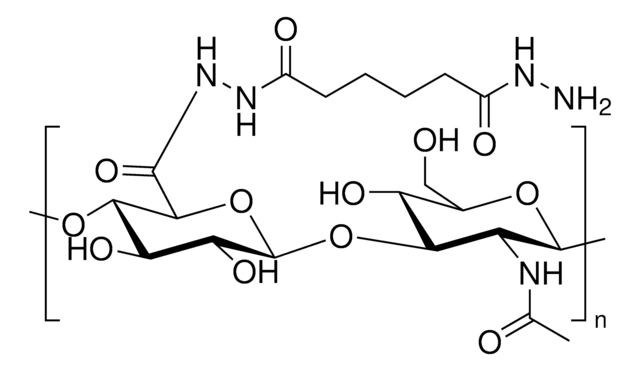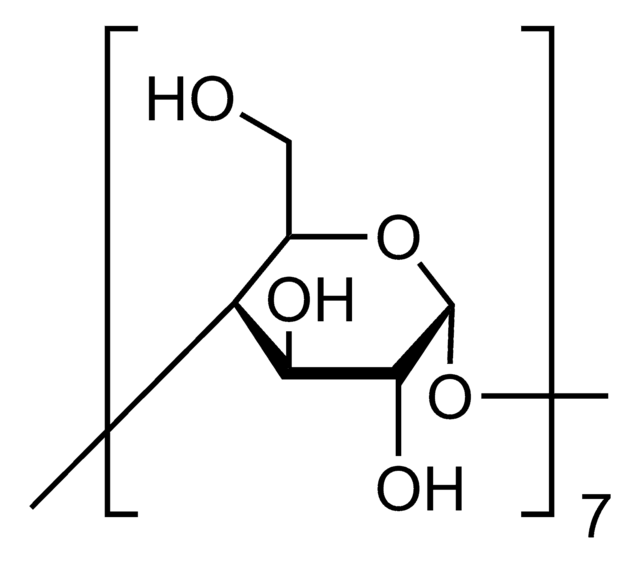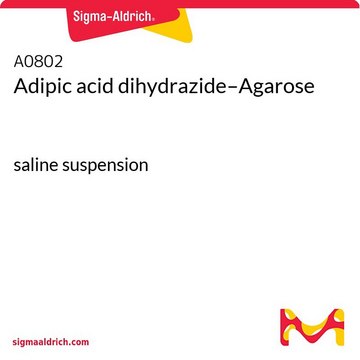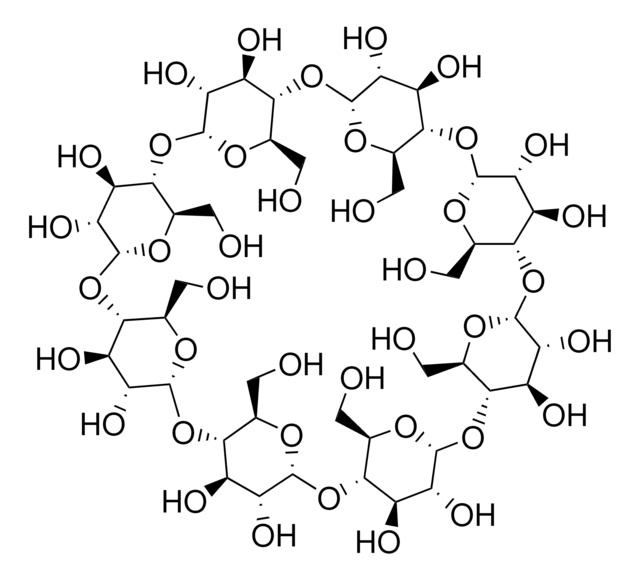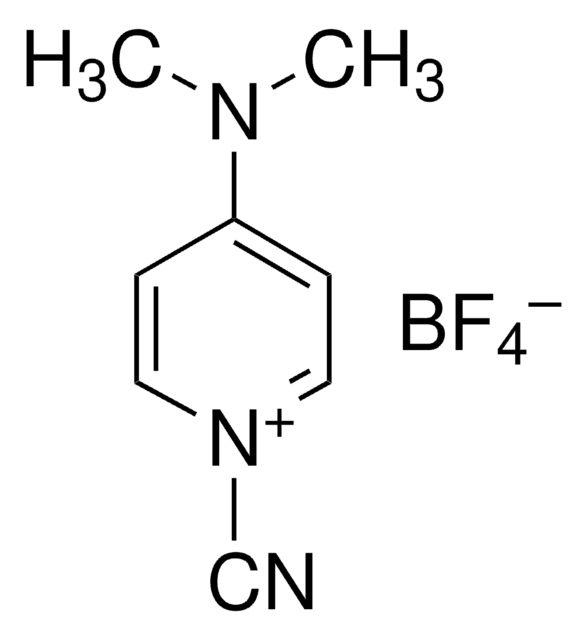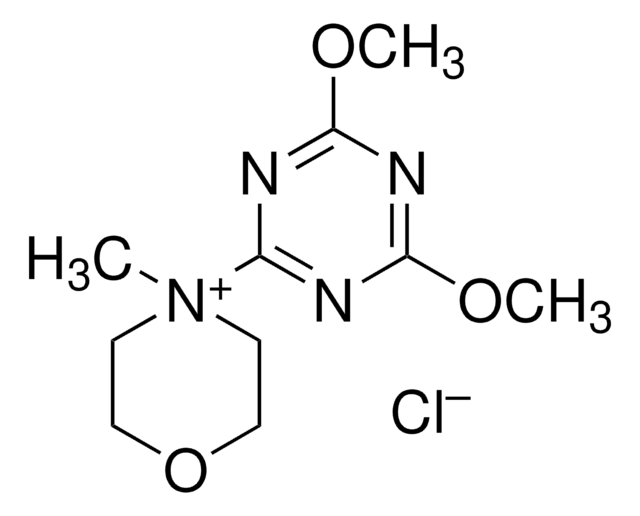A0638
Adipic acid dihydrazide
≥98% (titration)
Synonym(s):
Hexanedihydrazide
Sign Into View Organizational & Contract Pricing
All Photos(3)
About This Item
Linear Formula:
NH2NHCO(CH2)4CONHNH2
CAS Number:
Molecular Weight:
174.20
Beilstein:
973863
EC Number:
MDL number:
UNSPSC Code:
12352127
PubChem Substance ID:
NACRES:
NA.25
Recommended Products
Quality Level
Assay
≥98% (titration)
form
powder
reaction suitability
reagent type: cross-linking reagent
mp
180-182 °C (lit.)
solubility
H2O: 100 mg/mL
storage temp.
−20°C
SMILES string
NNC(=O)CCCCC(=O)NN
InChI
1S/C6H14N4O2/c7-9-5(11)3-1-2-4-6(12)10-8/h1-4,7-8H2,(H,9,11)(H,10,12)
InChI key
IBVAQQYNSHJXBV-UHFFFAOYSA-N
Looking for similar products? Visit Product Comparison Guide
General description
Adipic acid dihydrazide is a homobifunctional cross-linking reagent that is specific for aldehydes. This results in relatively stable hydrazone linkages. Adipic acid dihydrazide is generally used in the linking of glycoproteins, like antibodies, in a site-specific fashion following periodate oxidation. Oxidation and coupling may be performed at pH 5.0 due to the low pKa of the hydrazide which avoids competition by primary amines.
Application
Adipic acid dihydrazide has been used:
- in the preparation of reactive premix to synthesize the porous biomaterial
- for the crosslinking of methacrylated chondroitin sulfate (MA-CS) coating using carbodiimide-based chemistry for the production and characterization of methacrylated chondroitin sulfate magnetic nanoparticles (MA-CS MNPs)
- for the covalent labeling of rhamnolipids, pyochelin, and vancomycin with Abberior STARNHS ester dye
Biochem/physiol Actions
Adipic acid dihydrazide (ADH) is a low molecular weight compound that comprises a hydrazide group at each end. This leads to the supply of extra adsorption sites for heavy metals that maintain or elevate the adsorption capacities of the cross-linked adsorbents. ADH is used as a crosslinker in various fields, like making mechanical latexes films and injectable oxidized hyaluronic acid hydrogel.
Other Notes
Note that the hydrazone bond may be stabilized by selective reduction using, for example, sodium cyanoborohydride.
Hazard Statements
Precautionary Statements
Hazard Classifications
Aquatic Chronic 2
Storage Class Code
11 - Combustible Solids
WGK
WGK 3
Flash Point(F)
302.0 °F - closed cup
Flash Point(C)
150 °C - closed cup
Personal Protective Equipment
dust mask type N95 (US), Eyeshields, Gloves
Choose from one of the most recent versions:
Already Own This Product?
Find documentation for the products that you have recently purchased in the Document Library.
Customers Also Viewed
U Heimgartner et al.
The Biochemical journal, 267(3), 585-591 (1990-05-01)
After periodate oxidation and incubation with a dihydrazide, cross-linking of the two heavy chains of immunoglobulins G from several species proceeds specifically through their oligosaccharides. We have used malonic acid dihydrazide, adipic acid dihydrazide and dithiodipropionic acid dihydrazide. The last
Bartosz Gerard Gdaniec et al.
iScience, 25(1), 103669-103669 (2022-01-15)
Efficient delivery of toxic compounds to bacterial competitors is essential during interspecies microbial warfare. Rhamnolipids (RLPs) are glycolipids produced by Pseudomonas and Burkholderia species involved in solubilization and uptake of environmental aliphatic hydrocarbons and perform as biosurfactants for swarming motility.
Seema Nara et al.
Analytica chimica acta, 682(1-2), 66-71 (2010-11-09)
A rapid and semi-quantitative immunochromatographic strip (ICS) test for cortisol analysis in serum was developed. The test strip was based on a competitive assay format. Colloidal gold nanoparticles were synthesized and coupled with cortisol-3-carboxymethyloxime-adipic acid dihydrazide-bovine serum albumin (F-3-CMO-ADH-BSA) antigen
Tulsidas G Shrivastav et al.
Journal of immunoassay & immunochemistry, 33(1), 1-17 (2011-12-21)
The introduction of spacers in coating steroid antigen or enzyme conjugates or immunogen is known to exert an influence on the sensitivity of steroid enzyme immunoassays. We have introduced different homobifunctional spacers having varying atomic length (3 to 10) between
Lin-Song Li et al.
Pharmaceuticals (Basel, Switzerland), 14(2) (2021-02-03)
Functionalized gold nanoparticles (AuNPs) have been successfully used in many fields as a result of having low cytotoxicity, good biocompatibility, excellent optical properties, and their ability to target cancer cells. Here, we synthesized AuNP carriers that were modified by hyaluronic
Our team of scientists has experience in all areas of research including Life Science, Material Science, Chemical Synthesis, Chromatography, Analytical and many others.
Contact Technical Service